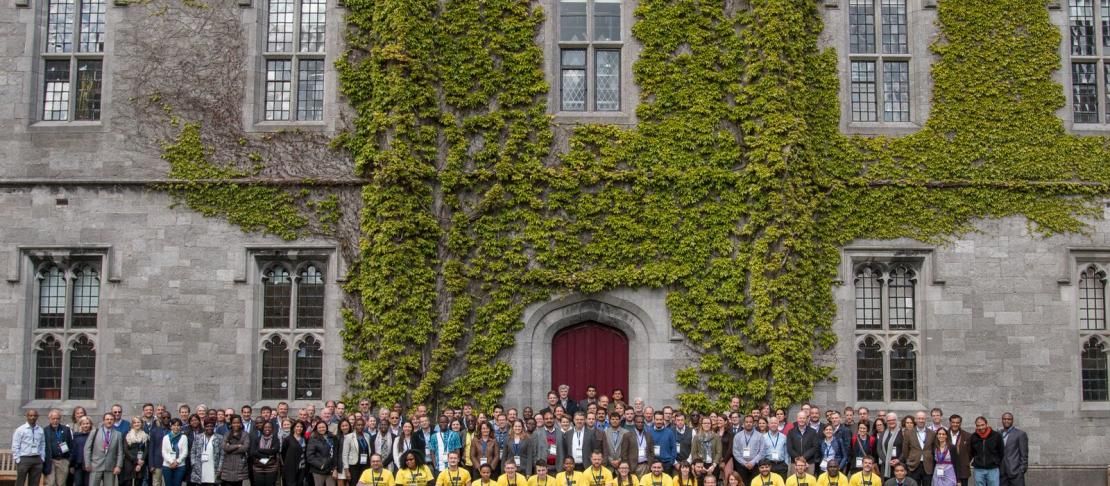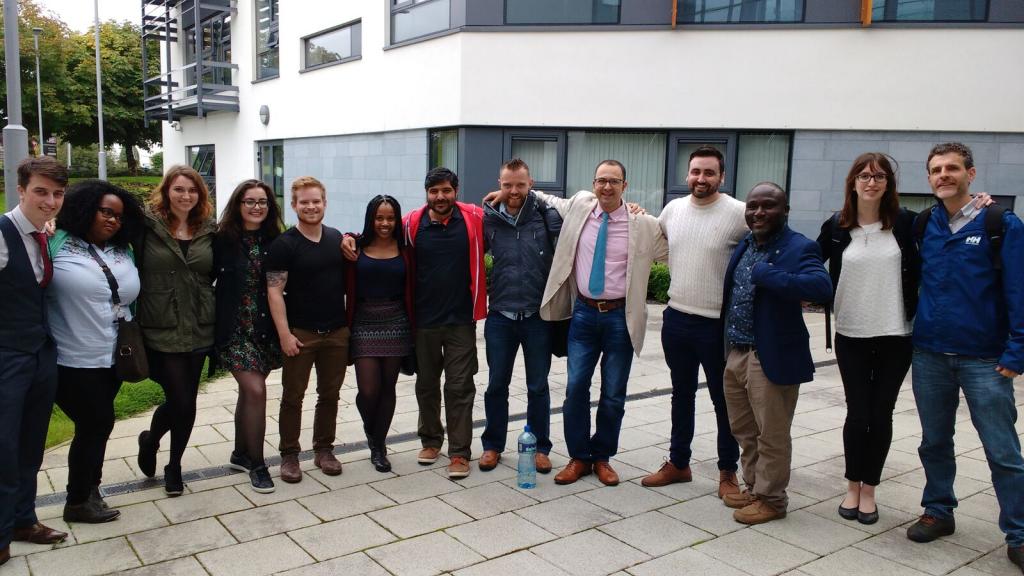NUI Galway's Masters degree program in Climate Change, Agriculture and Food Security (MScCCAFS)

Description
Sustainable development trajectories for humanity are inextricably linked to agriculture, food systems and climate change. The Masters degree program in Climate Change, Agriculture and Food Security (MScCCAFS) has been developed as an inter-disciplinary collaboration between the National University of Ireland Galway (NUI Galway) and CCAFS to train graduates to become “agents of change” for a sustainable future. The multi-disciplinary graduates of the MScCCAFS program are pursuing careers associated with local, national and international efforts to promote sustainable agricultural production and food security that is resilient to climate change impacts and shocks.
Course overview
The MScCCAFS is a 1-year, full-time course delivered in English within the Plant and AgriBioscience Research Centre (PABC) of the NUI Galway Ryan Institute, in close collaboration with the CGIAR Research Program on Climate Change, Agriculture and Food Security (CCAFS). NUI Galway was founded in 1845 and is among the top 1% of universities in the world. The MScCCAFS program comprises:
- 45 ECTS (European Credit Transfer System) of taught modules delivered by world-leading scientists which cover all aspects of climate change, agricultural adaptation and mitigation and food security;
- 15 ECTS of advanced skills and training modules; and
- 30 ECTS for a MScCCAFS Research Masters Thesis.
The MScCCAFS thesis research is usually carried out in the context of CCAFS projects underway in developing countries or with other international development partners, who also provide seminars and guest lectures to the MScCCAFS program. Previous MScCCAFS students have done their MScCCAFS research projects via research placements in South Africa, Malawi, Zambia, Ethiopia, Kenya, Tanzania, Uganda, Malaysia, Vietnam, the Philippines, Peru, Colombia, Italy, UK and Ireland. A flavor of MScCCAFS research projects of past and present MScCCAFS students can be gleaned from their MScCCAFS project blog stories.
Aims of the MScCCAFS program
- Provide a broad and in-depth background in climate change, agricultural production, food/nutrition, and health that will allow graduates to develop a thorough understanding of the interactions between climate change, agriculture and food security worldwide.
- Strengthen knowledge in classic and state-of-the-art research technologies applied in understanding the implications of climate change on agriculture and food production with specific emphasis on technologies applied in mitigation and adaptation strategies.
- Provide training in cutting-edge taught and practical components both at basic and advanced levels by introducing students to a research environment; assigning students a research project through which they will develop both technical competencies and critical thinking abilities.
- Produce graduates who are equipped with the balance of scientific, technical, analytical and crosscutting skills to significantly contribute to sustainable agriculture and food security.
- Produce graduates equipped to address the increasing challenge of global warming and declining food security on agricultural practices and policies and implement mitigation measures through strategic collaborations.
- Impart a solid foundation in scientific knowledge and technical skills for those who intend to go on to pursue a research career, including via PhD study.
Resources for applicants

Follow MScCCAFS
on Twitter!
The MScCCAFS begins each September and is open to any candidate with a degree in a relevant subject; applications may be made at any time.
- The PABC MScCCAFS website
- How to apply for the MScCCAFS program
- The NUI Galway application portal
MScCCAFS program outputs
- Diverse MScCCAFS Alumni: 63 past and current students (2014-2018) – 31 male and 32 female, from 18 different countries.
- MScCCAFS Alumni now pursuing careers in climate change, agriculture and development in international development organizations, ministries, universities, NGOs and start-up companies globally.
- MScCCAFS thesis projects as NUI Galway collaborations with eight CGIAR Centers, the Food and Agriculture Organization of the UN (FAO), World Food Program (WFP), International Fund for Agricultural Development (IFAD), World Bank, NGOs, universities and companies.
- Cross-cutting teaching and mentoring from over 50 world-leading experts in climate resilient agriculture, from NUI Galway, CCAFS and other partner institutions.
- The Annual Climate-KIC Galway Climathon, run by the MScCCAFS program in collaboration with Ryan Institute
- Best New Postgraduate Program Award (HEA Awards, Ireland) for 2017.
Funding sources
NUI-Galway is a CCAFS Strategic Partner. Students on the MScCCAFS course are supported by a range of funding sources, including fellowships such as Irish Aid Fellowships for students from Irish Aid key partner countries.
MScCCAFS alumni: where are they now?

MScCCAFS Class of 2016-2017
- Colm Duffy (2014-2015): PhD student in Climate Smart Agriculture at the Plant & Agriculture Research Centre (PABC) in Ryan Institute, NUI Galway.
- Willies Mwandira (2015-2016): Senior Program Coordinator of climate-smart agriculture activities with smallholder farmers in Malawi.
- Sinead Moran and Nathalie Mariefka (2015-2016): Co-founders of Foodture
- Andrew Morrow (2015-2016): Consultant for the Food Losses & Waste unit of FAO, Rome.
- Itumeleng Mafatshe (2015-2016): Deputy Director, Research and Data Analysis, Office of the Premier, Gauteng Provincial Government, South Africa.
- Michael Quinn (2015-2016): Consultant for UNICEF, New York.
- Lorna Born (2016-2017): Researcher in the Decision & Policy Analysis Unit at CIAT, Cali, Colombia.
- Donagh Hennessy (2016-2017): Climate Change Consultant for the Integrating Agriculture in National Adaptation Plans (NAP-Ag) program at FAO, Rome.
- Franklin Msiska (2016-2017): Head of Livelihoods Programme, Karonga District with CARITAS, Malawi.
- Rob O’Hagan (2016-2017): Chief Advisor to the CEO of the Borneo Orangutan Survival Foundation, Bogor, Indonesia.
- Matteo Petitti (2016-2017): working with evolutionary plant breeding network Rete Semi Rurali and Horizon2020 Project LIVESEED.
Further information
Professor Charles Spillane
Director of Ryan Institute
Head of Plant and AgriBiosciences Research Centre (PABC)
T: +353 91 494148 | E: charles.spillane@nuigalway.ie
Dr. Peter McKeown
MScCCAFS Program Co-ordinator
Plant and AgriBiosciences Research Centre (PABC)
T: +353 91 493388 | E: peter.mckeown@nuigalway.ie